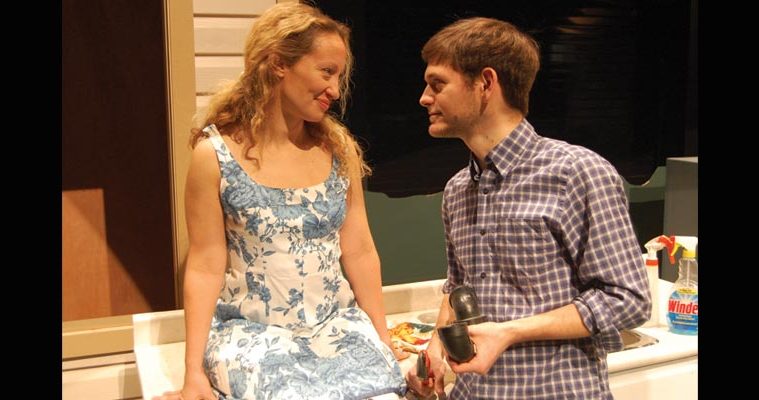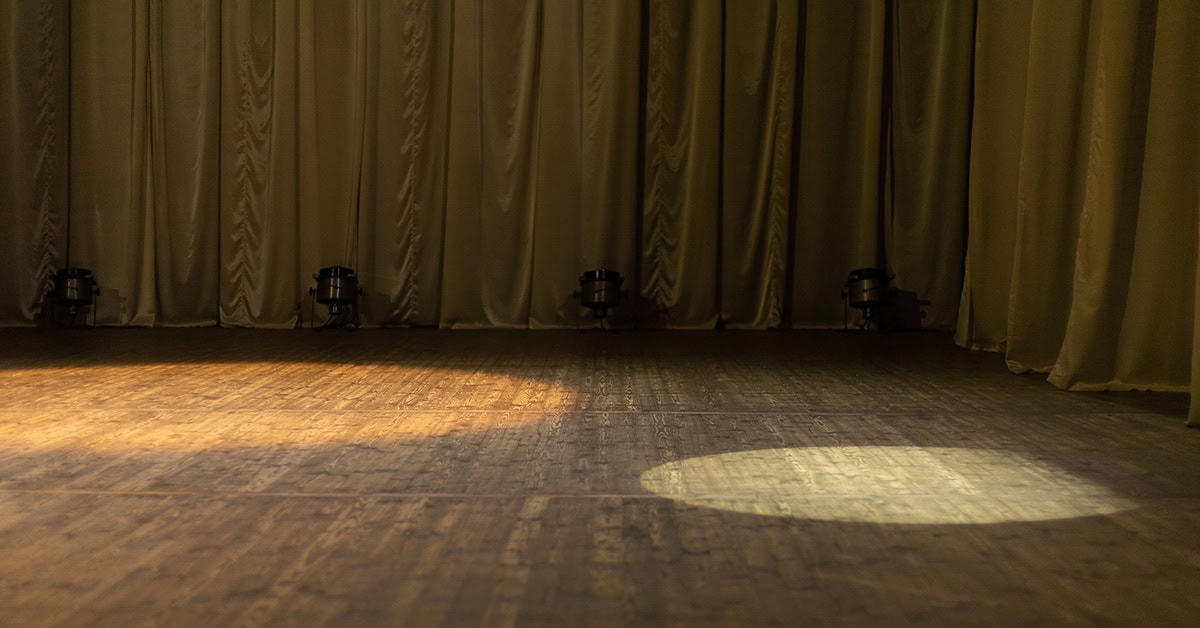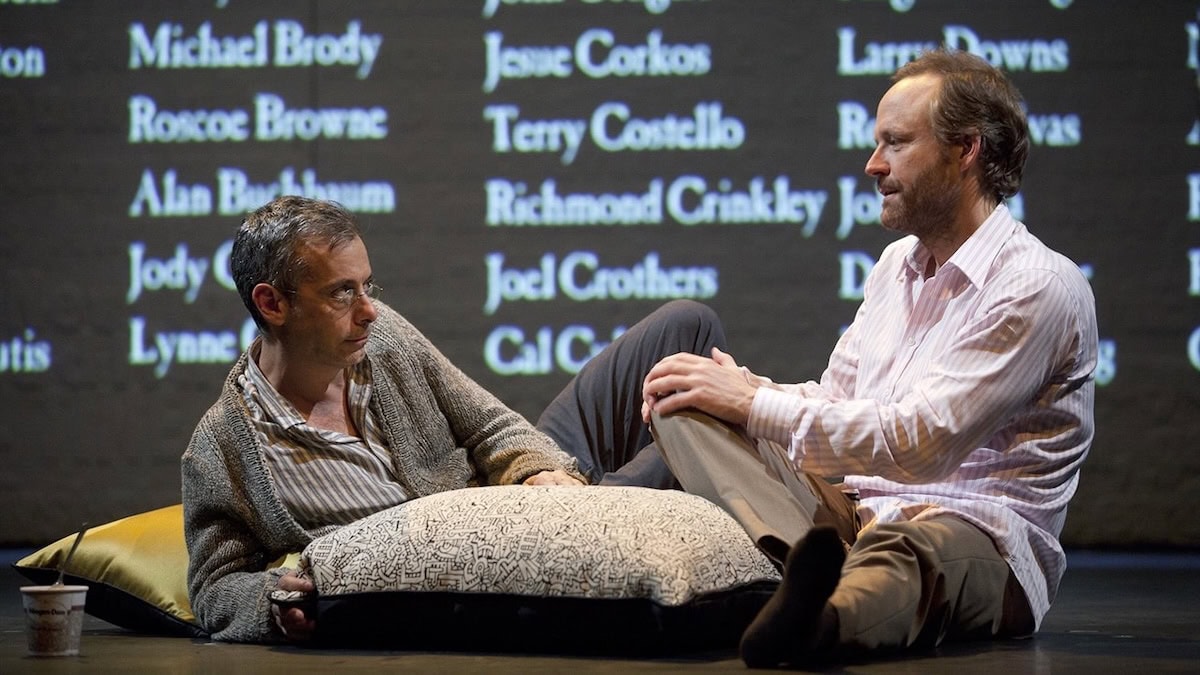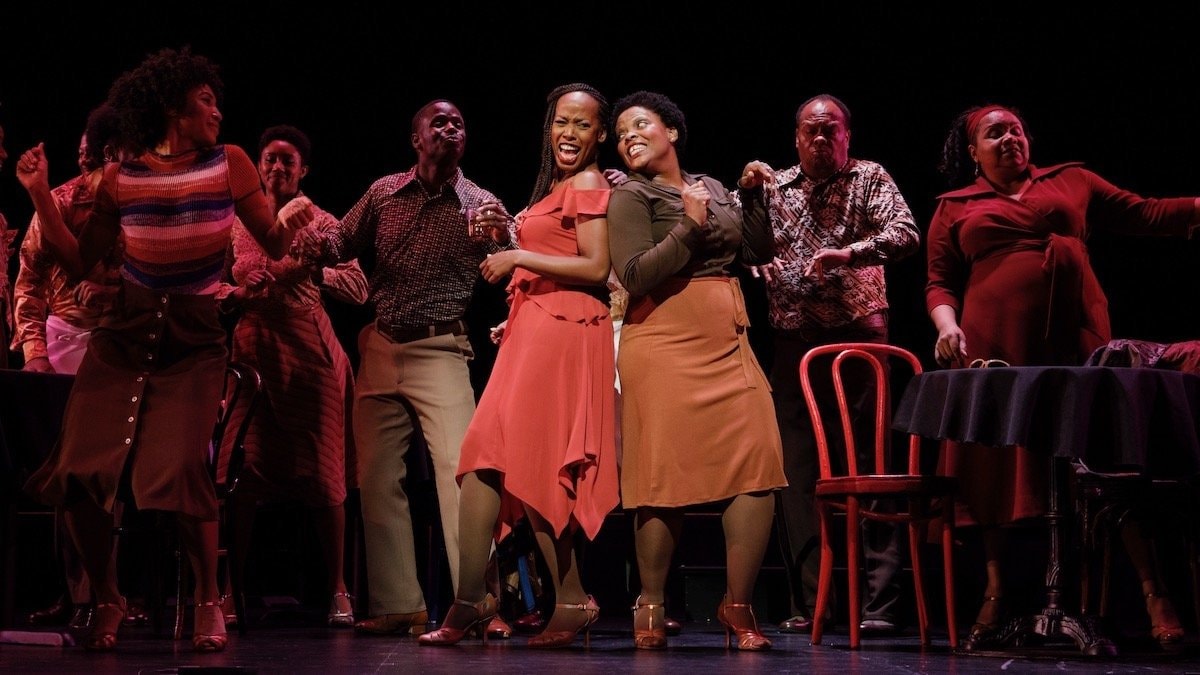
On a bitterly cold January night in Winnipeg, the geographic and metaphoric Middletown of Canada, rehearsal opens with the director counselling his cast to listen. To listen to each other, their own characters, “to listen in the moment, rather than [to] the memory of your performance or what it’s ‘supposed’ to be,” he says, quoting Alan Rickman. “All I want to see from an actor is the intensity and accuracy of their listening.”
Through the warm-up games and into the first act, it’s clear that cast members have been practising that skill.
We’re assembled at the new Taché Arts Centre theatre at the University of Manitoba for a run-through of Will Eno’s play, Middletown, directed by distinguished professor of English and film chair George Toles. Over the past number of years and to the delight of local theatre audiences, the long-time collaborator and screenwriter of the internationally-renowned filmmaker Guy Maddin has applied his incomparable talent to directing local theatre productions, often seeking out intriguing work by contemporary American playwrights.
It might seem odd to liken acting to listening, but as any good jazz player knows, such intuitive, intimate attention is foundational to collaborative performance. And reading and interpreting literature — including bringing a play to life — are close cousins of listening, in much the same way noted by Henry James in The Art of Fiction about the significance of experience for the writer, that “it is an immense sensibility, a kind of huge spider-web, of the finest silken threads, suspended in the chamber of consciousness and catching every air-borne particle in its tissue.”
And this also encapsulates something of Toles’ passion and sensibility as an ideal match for Eno’s bustling, sensitive script and slightly twisted, but mainly empathic, view of the world. As a director, Toles is a colourist; significantly, as with Eno, his primary tools are emotion and raucous humour on the side of empathy. He also challenges his actors to draw fully on internal resources and capacities, creating “a secure atmosphere for being with the group, listening within the group, finding your natural voice, finding a voice that can carry you further than you might naturally be inclined to go. People have to find more notes than they imagine they have within their range.”
Listening as key to Middletown came from Toles’ own reading of the play. He was “looking to find the right way of working with Eno’s monologue-heavy, extremely artful, stylized natural speech, in which something happens that’s virtually never done by playwrights: Which is that all the characters, at all times, are doing their level best to tell the truth.”
“Well, how do characters listen to people who are telling the truth?” Toles asked. “One thing I discovered is that, as opposed to customary comedies — where the whole rhythm depends on the characters not laughing at other characters are saying, and the audience is the only recipient — I would say [that for] this play, in which there’s so much awkwardness…among the characters, in their efforts to get at something that’s real to them, I thought that laughing at — but being surprised by things, and responding [to each other] with laughter, but then there’s always a turn in a slightly darker, more difficult direction, so the laughter never secures anything — would be one way of making the listening happen.”
So how to begin? With laughter, of course. Toles says he’s always (“always, always”) wanted to open a play with a “full-scale comic assault on an audience before they’re remotely ready for it.” Eno’s protracted prologue provided that opportunity, with its welcome to “every conceivable type of person in every conceivable mood,” he chuckles.
“I just love the idea of people getting so caught up in their mania to complete a task successfully that it just becomes its own thing,” he says, adding, “We made this our single need. What’s going on with the character is that she’s getting carried away in the act of introducing something, but rather than the introduction being a kind of behind-the-podium, extended harangue, I just thought it would be more fun to give every single word an emotional colour and expression so that she would have limitless transitions to make, but every word requires some sort of shift and bounce.”
And indeed, the actor (Laurie Macdonell) wrings vigorous punch from each animated, emotional word. Her speech is physical and builds up early and quickly, escalating to a hilarious, fever pitch before we’ve even met any of the characters.
With a rich text like Eno’s Middletown, Toles explains that rehearsal has been about “gradually … zeroing in on every phrase, every word, that every actor speaks. And doing our best to find a way to focus it, not to throw that word away…lifting every bit up to the light, and finding how we can make it something worth saying and worth listening to….That was a gigantic, ongoing rehearsal concern.”
Chockfull of such energized moments, packed with vivid items of business and internal and inter-character conflict, abuzz with electric intent and reverberations, the Black Hole production rewards its audience tenfold thanks to an accumulation of these minute, keen attentions.
The five-character intermission scene has been loaded with tension between characters but also, as Toles points out, resonates with other points in the play. “There’s so much potential for ricochet effects and no one can take in the full range of all of the effects simultaneously,” he says. “It’s like a [Jacques] Tati [scene], you have to make choices. So Sweetheart [for example] says something in intermission that hasn’t even been said yet, from the second act … ‘People know what happens.’ It’s interesting that it’s that line because Eno is saying that in every instance, you both do and you don’t know what’s happening.”
It’s a response to Thornton Wilder’s Our Town, Toles notes, in that Middletown “attempts to balance, in a very Wilder way, the claims of ordinary moments, which we’re doomed to squander, and the despair that comes from somehow not being able to get inside your own life as it’s happening.”
At one point, the cop, played by Kevin Ramberran — in addition to his alarming and screamingly funny admonition-to-the point-of-physical-assault of the drunken mechanic (Daniel Chen) about the importance of experiencing his life with AWE, MYSTERY, WONDER — does a slight, almost throwaway shrug on the word “holy” to describe his nightly patrol and paternal watch over the town. The gesture pulls the sentiment towards tenderness for the ordinary rather than feeling overly reverent or mawkish.
Toles mentions that Eno’s style has been described as “openhearted deadpan.”
“And I think that’s really good,” he says, “because deadpan is usually in the service of irony. But in Eno’s, even the harshest jokes…this is merely a way o
f easing the pain. Because the hearts are always open and they’re attempting always to say what they truly know and understand, the jokes are never just self-serving utterances behind a self-protective shield. They’re always advancing the enterprise of feeling.
“I think that’s something it took time for the cast to fully understand and work with,” he adds.
If Mary Swanson — played with mesmerizing, luminous grace in this production by Jen Robinson — is the open heart of the play, John Dodge lends the deadpan. And the actor who plays John, Rhodes Scholar and son of the director, Thomas Toles, does deadpan very, very well.
In the first scene between them, John is grinning like a maniac, moving with her, towards her, as though attached by string. Toles describes it as “the seemingly predatory moment when Mrs. Swanson’s first word to [John] is ‘gravity’ as though it just struck her that he should be interested in that. She says, ‘Whoa,’ he says ‘hi,’ she says ‘we just moved here,’ he comes very close to her, ‘that’s great – who’s we?’ has an aggressive note to it … [so it’s clear] that her presence instantly hits him hard and [he] goes for the question: ‘Okay, who’s in the way?’ instead of just casually inquiring.”
Toles adds, “Putting it so directly, which you think would be too much, but it turned out not to be. It pushes you back, but also gives you somehow…permission to move forward yourself with actual revelation.”
John Dodge says at one point, “Miracle, miracle, miracle.” Toles comments that Dodge can’t recognize and appreciate the mystery of the simplest actions, that there is something in the living process itself that seems to push us out. “So our despair is not because things are merely ordinary, but because we can’t evaluate the inexpressible element of every dimension,” Toles explains.
The push-pull of John and Mary’s encounter, with its seeming potential for romance, dissolves into that “middle zone” Eno engages, perhaps even, as the tourists name it, the “potentially monumental.”
As Toles notes, it’s the “potentially monumental things that the tour guide herself discovers in the act of saying it aloud. It’s not as though she knows before she says it, she finds it when she says it.”
And in this way, Middletown amplifies all that mid-span between birth and death, which is living, and as Toles says, “the kerpow and collisions of inner life and outer life we strangely do have ways of navigating.”
Middletown by Will Eno and directed by George Toles runs until February 6 at the Black Hole Theatre at the University of Manitoba. For tickets and more information, please click here.
To purchase a copy of Middletown, click here, and to learn more about licensing a production, click here.

Recommended Shows for Drama Festivals

The Truth Behind… The Normal Heart

